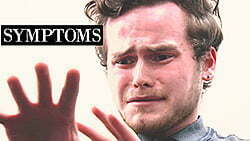How to Stop Illness Anxiety Disorder Symptoms

When most people have a minor symptom — an achy back or a scratchy throat — they decide to take the wait-and-see
approach. But if your first thought is cancer over cold, or multiple sclerosis over backache, it can be challenging to ignore the worries that pop into your head. For people with health anxiety, officially known as illness anxiety disorder, the fear of acquiring a serious disease is an everyday reality. If you think it sounds exhausting to live with constant anxiety over your health, that’s because it is! Health anxiety disorder can take up hours of your day and make it nearly impossible to think about anything else.
So, how do you break free from the grip of health anxiety to live a full and happy life? The process of recovering from health anxiety starts with identifying and coping with the symptoms of the disorder.
Symptoms of Health Anxiety
 Health anxiety used to be dismissed as hypochondria. Now, it is treated as an official diagnosis, under the name illness anxiety disorder. The symptoms of illness anxiety disorder include much more than the fear of catching a deadly disease. They can be physical as well as mental. In fact, part of the problem is that anxiety produces symptoms like dizziness and a racing heartbeat. People with illness anxiety disorder may mistake these symptoms for a serious health condition.
Health anxiety used to be dismissed as hypochondria. Now, it is treated as an official diagnosis, under the name illness anxiety disorder. The symptoms of illness anxiety disorder include much more than the fear of catching a deadly disease. They can be physical as well as mental. In fact, part of the problem is that anxiety produces symptoms like dizziness and a racing heartbeat. People with illness anxiety disorder may mistake these symptoms for a serious health condition.
Some symptoms of illness anxiety disorder to look out for include:
- Obsessing over minor bodily sensations
- Finding little or no reassurance in doctors’ appointments or negative test results
- Worrying about your risk of developing a condition that runs in your family
- Repeatedly checking your body for signs of disease
- Avoidance of people or places for fear of health risks
- Constantly talking about your health or possible illnesses
- Frequently Googling your symptoms online
- Difficulty functioning due to your preoccupation with your health
It’s important to take note of these symptoms, because not all health worries are due to illness anxiety. It is normal to be concerned about your health from time to time — especially during the COVID-19 pandemic! What isn’t normal is spending hours a day obsessing over your health. Or, receiving no reassurance from negative test results.
A good way to tell if you have illness anxiety disorder is to ask yourself if the concern is proportional to the symptom. For example, if you have itchy eyes and your first thought is cancer
over seasonal allergies
, you may be dealing with health anxiety. Another way is to ask yourself if your worries are excessive. If they take up several hours each day, your obsessive health concerns may be due to illness anxiety disorder.
What Can Help with Illness Anxiety Disorder?
 Health anxiety can prevent you from living life to the fullest. The occasional health scare is a part of life. Persistent worries, that are excessive and out-of-proportion, might signify the need for change. The treatment most often used for illness anxiety disorder is cognitive behavioral therapy (CBT). This modality of psychotherapy focuses on changing the way we think.
Health anxiety can prevent you from living life to the fullest. The occasional health scare is a part of life. Persistent worries, that are excessive and out-of-proportion, might signify the need for change. The treatment most often used for illness anxiety disorder is cognitive behavioral therapy (CBT). This modality of psychotherapy focuses on changing the way we think.
The idea of leaving safety behaviors, like body-checking or calling your doctor, behind can be scary at first. But, it’s important to weigh the costs and benefits. While the cost of change may be temporary discomfort, the benefit is that you can reclaim your life from health anxiety. Here’s how you can do it, using the principles of CBT:
Challenging Negative Thoughts
The best way to change unhelpful thoughts is to challenge your line of thinking. Often, we use thinking errors
to jump to conclusions that are overly negative or unrealistic. Some of the thinking errors common in people with health anxiety are selective attention — paying far more attention to symptoms than anything else — and catastrophizing — believing that every symptom is a sign of a serious disease. A therapist can help you address the thinking errors at the heart of your illness anxiety disorder, interrupt these unhelpful thinking patterns, and replace negative thoughts with more realistic ones instead.
Testing Your Predictions
Behavioral experiments can help you overcome health anxiety by de-catastrophizing frightening situations. Many people with health anxiety have thoughts like if I don’t use hand sanitizer right now, I will get a deadly disease
. By testing if these thoughts are true or not in a safe, controlled environment, you can gradually eliminate the need for compulsive behaviors or avoidance. It may be helpful to use a technique called exposure therapy to create a hierarchy of fears. With the support of a qualified therapist, you can start by testing the fears at the bottom of the list and work your way up to the things you find more challenging or anxiety-provoking.
Reducing Avoidance and Safety Behaviors
People often develop health anxiety because they have difficulty tolerating uncertainty. In truth, there is no way of predicting when a minor symptom could develop into something more serious — and that can be scary! But while uncertainty is undoubtedly frightening, avoidance and safety behaviors (such as body-checking or calling your doctor) can reinforce your fears, making matters worse. That’s why one of the major goals of CBT is to reduce your reliance on behaviors like body-checking, making doctors’ appointments, and avoidance. Your therapist can help you gradually cut down on your use of these behaviors until you no longer feel the need to rely on them at all, by replacing these compulsions with more helpful coping strategies.
This is post #2 on this topic.
We’re very busy helping people improve their mental health, but want to keep providing relevant helpful information to the community. We’ve engaged others to help us in writing these articles. We’d love to know which one you like better. Please leave your comments below, or email us your thoughts to our Comments mailbox. Go to post #1 Here. Thanks!
If you would like more information about our programs, or need help:
Call: (914) 241-0727 Tap Number on Mobile to Call Now
Email: inquiries@sironatherapies.com.

Jennifer L. Zauner, LCSWR
Clinical Director
| If You Like Our Content, Please Share and Click The Heart Below | |||
|---|---|---|---|

